| SHADOWS ON THE WALL | REVIEWS | NEWS | FESTIVAL | AWARDS | Q&A | ABOUT | TALKBACK | |||||
 Shadows off the beaten path Shadows off the beaten pathIndies, foreign, docs and shorts...
On this page:
CASTING |
LA LLORONA |
PAPICHA
| |||||
| See also: SHADOWS FILM FESTIVAL | Last update 7.Aug.20 | |||||
|
Casting Review by Rich Cline | 
| |||||
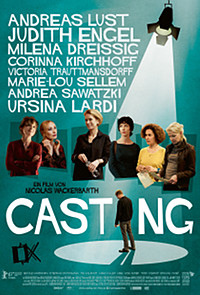 dir Nicolas Wackerbarth prd Franziska Specht scr Nicolas Wackerbarth, Hannes Held with Andreas Lust, Judith Engel, Milena Dreissig, Nicole Marischka, Stephan Grossmann, Ursina Lardi, Marie-Lou Sellem, Corinna Kirchhoff, Andrea Sawatzki, Victoria Trauttmansdorff, Tim Kalkhof, Anne Muller release Ger 2.Nov.17, UK 31.Jul.20 17/Germany 1h31 BERLIN FILM FEST 
Now streaming... |
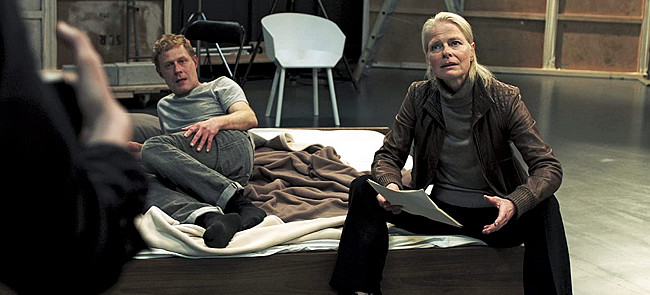 A verite style gives this German comedy the appearance of a reality TV show, as it follows people preparing to make a movie. And since the cast improvises the dialog, the film has a refreshingly breezy tone, with a constant flow of throwaway sequences that suddenly veer into pointed issues. This is an inventive exploration of the filmmaking process, and how each person faces distinct problems and prejudices. As the first day of shooting approaches, filmmaker Vera (Engel) is under pressure to cast the lead role in her remake of Fassbinder's classic The Bitter Tears of Petra von Kant. But she refuses to let herself be pushed one way or another. Actor Gerwin (Lust) steps in for the day, reading opposite the actresses as they audition, and each brings a distinct attitude to the role. And Gerwin connects so well with each of them that Vera begins thinking maybe he should take the male role instead of the star (Kalkhof) already lined up. This is a very talky film, which makes it a reading challenge for those who don't speak German. But the terrific dialog spirals through various conversations that dig into the process of moviemaking, plus themes from the film within the film. The ensemble cast never seems to be acting, simply inhabiting roles to make it clear who's in charge, who's out of his or her depth, and who has a huge reputation that demands respect. And the humour is bone-dry, pushing each character into a squirm-inducing corner. At the centre, Lust is superb as a hapless nice guy no one knows, resented as a replacement for the real actor, but able to seamlessly slip into scenes. And even when he can't, he finds something unexpected. Engel's Vera is wonderfully stubborn; she'll know Petra when she sees her. Of the actresses, Kirchhoff and Sawatzi stand out as scene-stealing divas who feel above the process. And Trauttmansdorff is terrific as an actress who gives Gerwin a run for his money. Several themes run through the scenes, provocatively touching on issues like the insecurity actresses feel as they age, the level of manliness expected of an actor, and the need for a director to keep the corporate bosses happy. There's also a range of issues relating to sexuality between both the actors on-set and the roles they're reading. This means that both the comical and emotional moments hit on multiple layers. And the clever sequence of scenes in the final act has a vicious kick.
| ||||
|
La Llorona Review by Rich Cline |  MUST
MUST  SEE SEE
| |||||
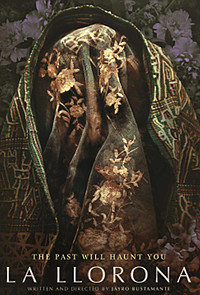 dir Jayro Bustamante scr Jayro Bustamante, Lisandro Sanchez prd Jayro Bustamante, Gustavo Matheu, Georges Renand, Marina Peralta with Maria Mercedes Coroy, Margarita Kenefic, Sabrina De La Hoz, Julio Diaz, Maria Telon, Ayla-Elea Hurtado, Juan Pablo Olyslager, Alejandra Colom, Enrique Arguello, Mara Martinez, Maribel Pio Telon, Enrique Salanic release UK Oct.19 lff, US 7.Aug.20 19/Guatemala 1h36 VENICE FILM FEST TORONTO FILM FEST LONDON FILM FEST SUNDANCE FILM FEST Now streaming... |
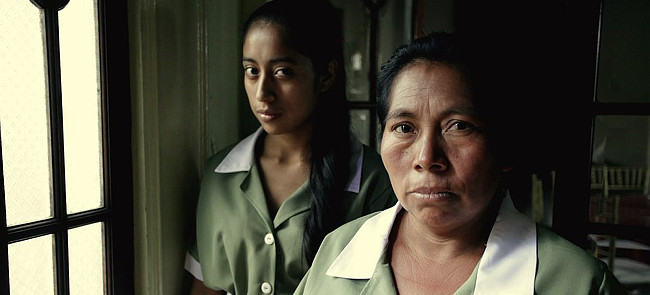 Swirling with ideas about class, religion, race, gender, history and economics, this freaky Guatemalan drama explores the legend of la llorona (the weeping woman). The title takes on a range of powerful meanings in filmmaker Jayro Bustamante's knowing exploration of government corruption and the repercussions of colonialism in Latin America. The film is strikingly shot with a mix of artful imagery, doc-style authenticity and full-on horror. After old Enrique (Diaz) fires a gun in the middle of the night, his wealthy family's servants resign en masse, terrified because he says he heard la llorona. And they know why. A retired military general, Enrique has been charged with genocide against the nation's indigenous Kaqchikel people. As the city erupts in protest, serene new maid Alma (Coroy) arrives to help veteran housekeeper Valeriana (Telon), who turns to traditional remedies to help the clearly not senile Enrique, his imperious wife Carmen (Kenefic), doctor daughter Natalia (De La Hoz) and curious grandaughter Sara (Hurtado). The array of disparate people trapped in this enormous old house gives the film a strong female slant. The only men are the unnerved Enrique and his beefy bodyguard (Olyslager). Bustamante skilfully builds a sense of danger with the unruly crowd outside, while things inside are even more insidious. There are chilling contrasts everywhere, from noisy daytime riots to quiet bumps in the night, from the cooly distant family to their openly emotional staff, from Enrique's dry rasp to Alma's obsession with water. The layers of history are beautifully played by three generations of actors. Each person is on his or her own odyssey, and the gifted cast members find nuance and texture in every scene. Coroy's Alma is a wonderfully enigmatic catalyst at the centre of the story. She bonds with De La Hoz's thoughtful, observant Natalia over their shared pain about their missing husbands. And Natalia is only too aware that her father hated hers. While Kenefic has a superb haunted presence as a woman reluctantly reliving her suppressed past. With the constant roar of street protests and Bustamante's inventive visual touches, the film often adopts a dreamlike tone (including a few actual dreams). This creates a terrifying atmosphere, as the goings-on during both the day and night become increasingly intense. Each of these elements connects the story and characters to the Guatemalan earth in unexpected ways. As a news reporter says, "Guatemala is tired of crying over its missing people."
| ||||
|
Papicha Review by Rich Cline | 
| |||||
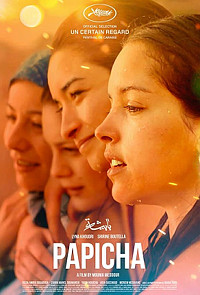 dir-scr Mounia Meddour prd Xavier Gens, Patrick Andre, Gregoire Gensollen, Belkacem Hadjadj, Mounia Meddour with Lyna Khoudri, Shirine Boutella, Hilda Amira Douaouda, Yasin Houicha, Zahra Manel Doumandji, Nadia Kaci, Marwan Zeghbib, Aida Ghechoud, Meriem Medjkrane, Samir El Hakim, Amine Mentseur, Khaled Benaissa release US Jan.20 psiff, UK 7.Aug.20 19/Algeria 1h48 CANNES FILM FEST Now streaming... |
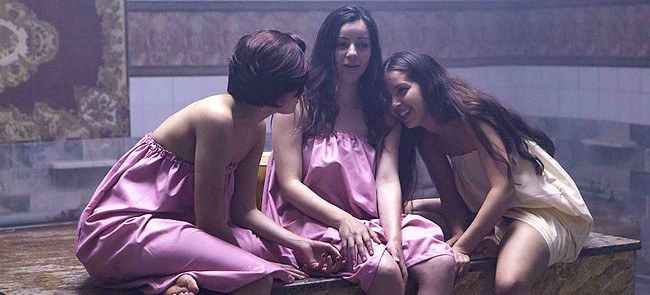 There's a refreshing blast of female energy in this drama from Algeria, which centres on young women seeking freedom from an oppressive regime. It's gorgeously written and directed by Mounia Meddour, revealing details of life and culture that are earthy and honest, including stunning depictions of the threat of everyday violence. The attempt to include a full range of women's issues sometimes feels pushy, but the characters are fiercely engaging. In late-90s Algiers, as terrorists create harsh Islamist rule, high-spirited student Nedjma (Khoudri) and her friends, including the lively Wassila (Boutella) and more conservative Samira (Douaouda), are determined to maintain control over their bodies and clothing, even as domineering forces close in around them. When Nedjma's journalist sister Linda (Medjkrane) is murdered, she decides to take on the system with a fashion show using designs made from the haik, a traditional Algerian garment. But there's rather a lot of push-back from all sides, especially when the university literally walls them inside. The title is slang for a stylish young women, and these are seriously likeable: playing pranks, joking about silly things that happen to them, doing quick changes in and out of conservative clothing to avoid trouble at home. They also don't take abusive insults lightly. And what's happening in their culture is downright horrific, as female radicals barge in to protest the university for teaching things like foreign languages. They demand compliance from Nedjma and her friends. And the men have even harsher opinions. The performances are raw and natural, beautifully catching the inner spark within these women that the fanatical leaders are so determined to silence. These young people know they have more to offer their society than silence and childbirth. Khoudri is terrific as the strong-willed Nedjma, easily transitioning between the script's wild mood swings and generating terrific chemistry with Boutella, Douaouda and others. The male characters are less complex, including a predatory doorman (Hakim) and two cute guys (Houicha and Zeghbib) who court Nedjma and Wassila. Nedjma says she's not trying to provoke the fanatics, but instead defeat them with indifference. Determined to put her country back on course, her rebellion begins with a reaction to ubiquitous posters insisting that women should wear full-length hijabs. The script goes on to encompass several major themes, sometimes a little haphazardly. And there are some intensely melodramatic plot points. But this is a vivid depiction of youthful idealism standing against a tidal wave of hypocrisy and oppression.
| ||||

See also: SHADOWS FILM FESTIVAL © 2020 by Rich Cline, Shadows
on the Wall
HOME | REVIEWS | NEWS | FESTIVAL | AWARDS
| Q&A | ABOUT | TALKBACK | | ||||

